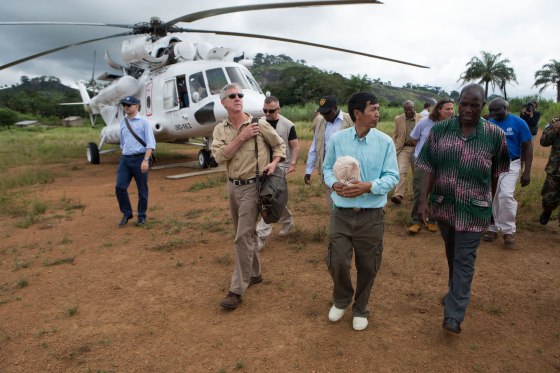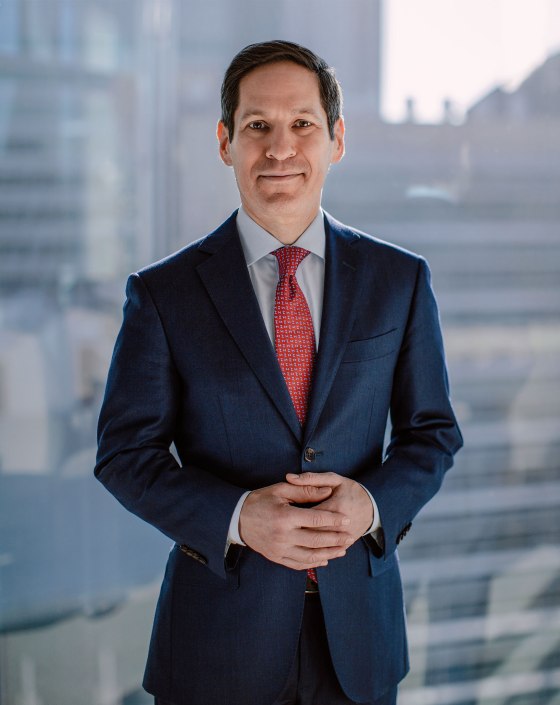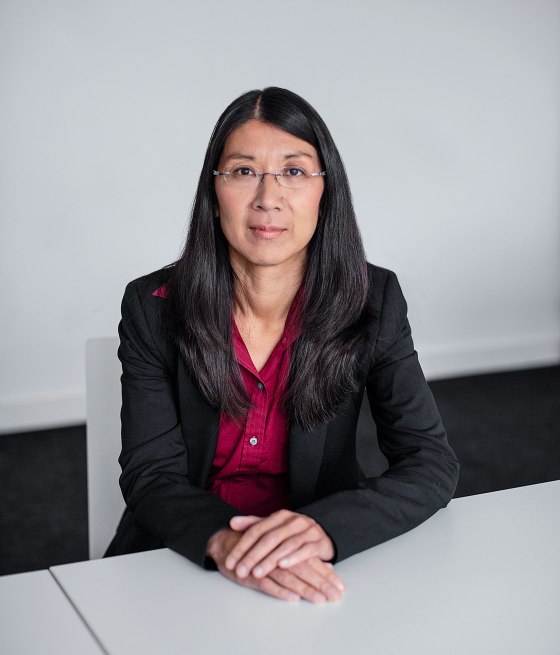Head of the U.N. Mission for Ebola Emergency Response (UNMEER)

In the first two months of UNMEER, I never took a break: 60 straight days of 14-hour days. I was brought in late to the response, but I’ve learned fast.
On Sept. 8, I got into my office and was approached by my boss. He told me the Secretary-General wanted me to serve as the manager of the U.N. Ebola response. I hadn’t yet been involved in the outbreak, so I took 24 hours to read everything I could get my hands on. I quickly came to the realization that this wasn’t just a public–health crisis. I’d managed humanitarian relief for the World Food Programme, but this was much more complex and impacted so many different sectors of society at the same time.
By Sept. 29, we landed in Ghana, our base for the mission, and less than 48 hours later, I was in Monrovia, Liberia. Within two months, I was in each Ebola-affected country three times, meeting with heads of state to coordinated a cooperative response and assessing treatment facilities, and meeting with the locals touched by the devastating disease.
During one visit in Kenema, Sierra Leone, I stopped by a graveyard outside one of the Ebola treatment facilities. I was struck by the number of freshly made graves, each marked with the name, date, age and gender of the person buried. But the hardest part was looking at the series of newly dug, empty graves. I knew that there were people I had met in the facility I had just toured who were going to end up in those holes. At that moment I was hit by a personal sense of responsibility to just bloody get this job done as fast as we could.
On that same trip, I met with a group of Kenema survivors. They were completely healed, with no residual effects from Ebola. They brought this sense of hope that we’re going to get through this, though many of them were feeling stigmatized. The Kenema survivors and the empty graves are what compel me to work harder. The longer it takes, the more new holes in the ground.
Our goal for the first 30 days was to mobilize resources and get people and response capacity on the ground. We’ve opened offices and communication spaces in four countries. We’ve airlifted vehicles, we have helicopters, airplanes. Second, we’ve worked with the local and national governments to put in place the necessary crisis-management architecture, which is an absolute must before we implement work on the ground. Lastly, we’ve developed a plan to defeat this virus for each country.
We’ve never faced a crisis like this before. The capabilities necessary to bring it to a conclusion are really complex, and we need a lot of different things to make that happen. Getting that plan in place is just one of the things that’s an absolutely necessary precondition for success. It’s not enough, but we need those things.
The next 30 days are all about putting these capacities into action and getting this done. Our biggest challenge right now is meeting the necessary geographic coverage. Because of the way the crisis had looked, there was a big focus on very large treatment facilities—100-bed ones. Now we need to be more geographically dispersed, with 20-to-25-bed facilities in more areas. We also need the personnel to manage and staff them—finding doctors and nurses is a simpler task than finding individuals with the capabilities to ensure that the facilities are run properly. We need diagnostic laboratories. Malaria, for instance, has similar symptoms to Ebola, and we need to be able to differentiate between the two quickly. And we need money.
I’m proud of what we’ve accomplished so far and of our plan for defeating this outbreak, but I acknowledge that people have criticized us for reacting too slow. In retrospect, the whole world wishes we had done more, and done it earlier. I don’t think you’ll find a single person who would disagree with that notion. I have nothing but respect for MSF and the work they’ve done, and the efforts to draw more attention to the Ebola crisis. But people are getting Ebola today and they’re dying of Ebola today. At UNMEER we are absolutely obsessed with bringing the crisis to an end as quickly as possible and preventing more people from dying. So I understand the criticism, but I’ll focus on the future. —as told to Alexandra Sifferlin
Director of the Centers for Disease Control and Prevention (CDC), Atlanta

When Ebola first hit West Africa, we were deeply concerned. Because it didn’t get there by magic. It’s there. It’s there in nature somewhere, and if it’s there, it’s probably other places too, in countries that are very poorly prepared, countries that have very little public-health infrastructure.
In March, I was told about the cases by my staff. In March, what I heard from my staff was “We have Ebola for the first time in West Africa. We need to get a team out there now to stop it.” The CDC has close to 2,000 staff working in 60 countries. We send teams out a lot—a couple of times a week for different outbreaks and investigations. So it’s not uncommon. But Ebola has a special place because it requires such meticulous attention to detail to get it right, and it’s so deadly, so scary.
It was a no-brainer to send the team. It’s not like, “Gee, should we send someone or not?” It’s “How soon can you get on a plane? How soon can we get a visa to the country? How many people can go?” You’ve got a problem like Ebola, you’re there. The bottom line is lives saved. That’s what motivates us, why we work 24/7. Many of us have not had a day off since March. That’s fine. It’s what we went to medical school for.
So when the cases first hit, we sent in a team, and our team felt they could help control it. But there was some friction with WHO [World Health Organization], which I had to get involved in. Essentially, people thought it was going to be controlled, and they didn’t want us there. So I had to get directly involved, to tell WHO, “Let our team in, this is ridiculous.” They wanted to do it themselves. There was resentment. They didn’t want to feel like they were dependent on the CDC, who didn’t want us there, so we left. And then Ebola came roaring back.
In fact, WHO has great Ebola experts, but I think WHO is really three different organizations: Geneva, the regional office and the country office. Geneva was fine, but the regional and country offices were very difficult to deal with and very problematic. So we had challenges. But that’s water under the bridge. WHO knows they didn’t do what they should have, and we need to help them think about how to get more functional moving forward.
When I activated the Emergency Operations Center here in Atlanta, it was immediately clear we were overmatched by the epidemic. It was moving so fast in places that were so ill-prepared and in cities where we had never seen significant spread of Ebola before. This was a new phenomenon. This was the same virus but in a different environment. It was acting differently, and it was much harder to control.
And it felt like however much we threw at it, it just kept growing. We were sending more and more staff, doing more and more work in the field, more lab work, working with MSF [Doctors Without Borders]—we have a very good relationship with MSF. This was clearly going to be bigger than what we at CDC can do despite our putting all our effort into it. But whatever we did, the cases just kept increasing. The frustration was just unbearable.
Because I basically am a very impatient person by nature, I felt I had to go. By the time I got there in late August, the situation was horrific. I’ve seen a lot in my 25 years in public health. I worked in the slums in India, I traveled to various parts of Africa working on HIV. But I’ve never seen the kind of things I saw there. I went into an Ebola treatment unit where I walked in, and there was a young boy, probably 16, in terrible shape. He’s sitting on a rickety chair, half out of it, and he’s got a bottle of oral hydration fluid next to him. I was just pleading with him to please drink all he can because it can make a huge difference. He took a sip and put it back down.
I walked into another unit in -Liberia—it’s a tent hospital with gravel pits, garbage everywhere, and the incinerator stopped working so garbage was backing up. There’s one doctor for 120 patients. There are three patients there who had died overnight, and they didn’t have enough staff. They have to bring in more staff to bring the bodies to the morgue. There is this woman, and I see beautiful, beautiful cornrow hair, beautifully plaited, all of it, down the back. Someone spent many, many hours plaiting this hair, beautifully cared for. And she’s lying face down on the mattress, half on, half off the mattress, and there are flies on her legs, and she’s dead.
The patients who are getting better are obviously horrified by this. I spoke at some length to one woman who clearly was going make it. She was in shock—her husband had died, she had cared for her husband, that’s how she became infected. The enormity of what was happening was just very hard for her to fathom. She had this look of being stunned.
One of the roles of the CDC is to bear witness, to tell it like it is, whether that’s unpopular or uncomfortable. We’re a technical agency. We’re going to tell it straight the best we know it. We also immediately began saying we need some new tools. We need to accelerate vaccine work. There are a couple of good vaccines in trials—let’s move as fast as humanly possible to figure out if they work. And let’s also not count on them. Because maybe they work, but maybe they don’t work. We’ve got to take the possibility that we are going to be fighting this without a vaccine. We’ve stopped every outbreak until now. But it takes hard work, and hard work that’s not necessarily glamorous.
If we look at what happened with Thomas Eric Duncan in that first ER visit in September, they didn’t think of Ebola. They did a number of tests. They did an MRI on him, they drew blood on him, and did many things, but none of the health care workers who cared for him got infected.
Then when he came back on the 28th, he was very ill, with lots of diarrhea, vomiting, and the nurses and hospital were trying to follow CDC protocol. Whatever happened, it appears that before Duncan was diagnosed, two nurses, Nina Pham and Amber Vinson, got infected. That was just—that made us recognize our guidelines had to be stronger. We had issued them based on the best information we had. They had been endorsed by specialty societies, consistent with WHO recs. They had worked when they had been used in Africa. But they didn’t work here.
Some people would say, “Shouldn’t you have known better?” In retrospect, sure, we wish we had a different set of guidelines initially. But the way medicine works, the way public health works, you get more information, you act based on the new information. The fact that two health care workers got infected trying to implement CDC guidelines told us we needed to add a margin of safety. We immediately did.
We can’t guarantee there won’t be another case. We can’t guarantee that there won’t be a hospital that misses a diagnosis or health care workers who get infected. We can guarantee that we will do everything in our power to protect Americans. That’s our top priority. The fact is we can’t make it zero here until we stop the epidemic in West Africa.
I’m determined to do everything I can and help CDC do everything we can to support the U.S. government and the rest of the global community, but most important, the communities in West Africa to put an end to this. But it is going to be a long, hard fight. —as told to Alice Park
International president of Doctors Without Borders/Médecins Sans Frontières (MSF)

Right away there was something different about this outbreak. Even before March, there were rumors about Ebola. My staff heard them, and in March we sent a small team in to investigate and bring back samples. When Ebola was confirmed, we deployed a team to treat patients and track down people who might be infected.
We started talking to various agencies, pushing them and telling them just that, but we were quickly told by a variety of them that we were crying wolf. In June, we found out that we were in real trouble. We went on the radio, on TV, to high-profile meetings, saying, “This is an emergency.” We were ringing the alarm, but at the end of the day, we didn’t have the authority or legitimacy to call it a public-health emergency.
I remember very well the WHO saying the outbreak was under control, and it took us awhile to convince them that it was not. When WHO gives the signal, people cannot ignore it anymore. They cannot pretend it doesn’t exist. But the harsh reality is that, looking at the cold figures, there were around 2,000 people infected in early August. That’s less than the number of people dying in other crises such as in South Sudan, the Central African Republic, Gaza. So it was hard to bring a sense of urgency. People asked, ‘What’s the big deal?’ I replied ‘Our teams are in those places too, including for Syria, Myanmar and Ukraine, we are stretched, yet we are also responding to the Ebola epidemic.’
The wake-up call came when volunteers from Samaritan’s Purse were infected in late July. Suddenly, Ebola wasn’t such a distant reality for the Western world. A few days after that, the WHO declared a health emergency of international concern.
I was invited to speak on behalf of MSF in front of the U.N. state members on Sept. 2. We were quite desperate, and I stayed up with my staff until early in the morning writing my speech. I ended up saying, “To put out this fire, we must run into the burning building.” I told them we’d been losing against the outbreak for the last six months, but we could win the next three if we joined together our efforts and resources. Our message was heard, but it didn’t translate right away to the action we were hoping for. Generous pledges were made by 130 nations—that’s outstanding, but it goes to waste unless it results in direct action on the ground. When you tell me that you will deploy in eight to 10 weeks, my staff is basically crying.
It’s uncomfortable to have the pressure of being the key responder to a crisis as great as Ebola. MSF isn’t perfect. We have our own issues, and like everyone else, there are some areas in which we could’ve done better. The most appalling thing from this epidemic is that when there’s a public-health emergency, no one feels responsible to tackle it or respond. Why don’t we learn from one crisis to another? I find it absolutely ridiculous and unreasonable to ask a private international organization like MSF to become the leader of this response.
The reality is that, by sending in international staff, there’s fear of bringing Ebola back to other countries. When there were cases of Ebola in the States, I respected that people wanted to address concerns and take some sort of action, but the focus turned completely to the U.S. At one point we started to wonder, Where is the Ebola epidemic happening? The States—or West Africa?
For my staff, which includes many local workers, there’s tremendous stress. One of my colleagues described fighting Ebola like being on the front line of a war and having a machine gun fire at you all the time. In September, we would open our isolation units for only a few minutes, just to fill the beds where people had died overnight. After that we had to turn everyone away. It was a completely inhumane situation. You see people facing death without their loved ones, only with people in space suits. We’ve been very lucky. We’ve had a few infected staff, but not many.
The first time I heard that one of our members was infected, I got a phone call in the middle of the night. It’s devastating, and you feel like the sky is breaking over you. It’s very difficult for the spirit of our staff. We wish there was zero risk, but in everything we do, zero risk doesn’t exist.
Right now, it’s true that we are seeing reports of fewer cases in certain areas, such as Monrovia and around Kissi, but we don’t have the full picture. It’s not slowing down everywhere. We have to continue to increase our response with a concerted effort. Maybe the worst-case scenario won’t happen, but we can’t let our guard down. —as told to Alexandra Sifferlin